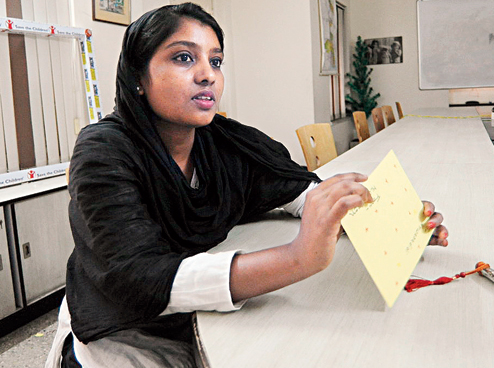
It is not every day that a 12-year-old saves another girl from being trafficked. But Anoyara Khatun was that age when she saved another girl from being taken to a dance bar in a city.
Because she knew what it would be like. A few months ago, Anoyara herself had been trafficked from her village in the Sandeshkhali area of the Sunderbans, Ajgara, to Delhi. It is something she still does not want to talk about. But she refused to be scarred by it. On the contrary.
She had been rescued and brought back to the village with the help of the NGO Save the Children. Back home, she would visit the centre for children run by DSWS, Save the Children's partner organisation, where she was part of the children's group - Shishu Dol. One of the group's main activities was to keep a watch on the arrival of possible traffickers in the village.
Anoyara also constantly plotted how to become the leader of the group.
At 7pm on the evening the other girl was being sent away to the dance bar, Anoyara wanted to stop her. But her mother wouldn't allow it. It was already a late hour in the village. And in any case, it was not Anoyara's business.
But after an hour of futile argument, when finally Anoyara asked her mother if she wanted what happened to her, Anoyara, to happen to yet another girl from the village, her mother suddenly relented.
She ran with the team of children to the girl's house and the entire village descended on it too. The parents, afraid now, were forced to keep their daughter back, though they let the traffickers escape.
That was in 2007. A lot has happened since then. Today Anoyara is an attractive 19-year-old, who is a BA first-year student at Bamanpukur Humayun Kabir Mahavidyalay, and on her way to New York to attend the United Nations General Assembly Meet on Sustainable Development Goals as India's only youth delegate. During her 10-day stay there, she will speak about what children from her village want: education, health, opportunity, end of abuse.
She is a confident speaker. Last year she had visited Belgium to speak at an international conference.
Metro had on November 3 last year written about Anoyara's sufferings, struggles and triumphs (see picture).
Anoyara has prevented many cases of trafficking and child marriage, "which can be a form of trafficking". She is the only person in the neighbouring villages who has been abroad. The villagers are proud of Anoyara.
Today, Anoyara is the leader of the 80 children's teams in the 80 villages in Sandeshkhali's two blocks and Minakhan. And long ago, she had achieved her first goal: being elected the leader of the children's team in her village.
More important, the villagers love her.
Most important, Ajgara, she proudly declares, is trafficking-free.
Even after cyclone Aila in 2009, which led to a great increase in trafficking from the Sunderbans, Ajgara did not report any case.
It is because Ajgara realised what trafficking really is, Anoyara feels.
For trafficking is not an isolated crime. It happens within the community, and often the stake-holders are from within the community. Quite often the parents, in a poor village like Ajgara, are compelled to make hard choices.
"The traffickers know everything about a village. After taking the girls away, they bring back albums with the girls' photographs. But often there is no trace of the girls later," says Anoyara.
"The traffickers know each family. They target families that are the poorest, or are very large, or have fathers who are alcoholic," she says.
The children, who would suffer most, turned into activists.
"We would study, play, sing and dance the whole day at the centre," says Anoyara. But after 3pm, they would turn sleuths, sniffing out possible traffickers.
If there was a possible case of trafficking, the children would intervene, by themselves. "We would first talk to the child. Then to the parents," says Anoyara.
If they still did not relent, the Child Protection Committee would be brought in, and if it still did not work, then the police.
"It was very difficult at first," says Anoyara. Convincing her own family, then talking to families, then going to the police.
"Today the whole village supports me. And when we go to the police station, they ask us "chocolate na cha? Chocolate or tea?" But she never asks a rescued girl what she went through. It does not matter. "But later, when we get closer, it comes up by itself."
Related Story: Our very own Malala: trafficked at 12, crusader and global Girl Hero at 18











